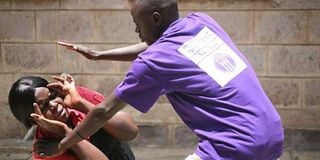Fida raises concern over high cases of domestic violence

Cases of domestic violence reported to the Federation of Women Lawyers (Fida) hit a five-year high in the first half of 2018, the organisation says. PHOTO | FILE | NATION MEDIA GROUP
What you need to know:
- Fida Kenya Chairperson Josephine Mong’are said the escalation of violence makes the organisation very worried.
- State Department for Gender Affairs said domestic violence has plagued the middle class in the country.
- The world marks the International Day for the Elimination of Violence against Women this Sunday.
Cases of domestic violence reported to the Federation of Women Lawyers (Fida) hit a five-year high in the first half of 2018, the organisation says.
Fida Legal Aid Clinic says it handled 2,182 domestic violence cases between January and June.
In 2017, the figure stood at 2,028 in the same period.
Fida Kenya Chairperson Josephine Mong’are told the Nation that the escalation of violence makes the organisation very worried.
“There needs to be a concerted effort from all sectors of the society to work towards the reduction of gender-based violence,” Ms Mong’are said.
MIDDLE CLASS
Recently, the State Department for Gender Affairs said domestic violence has plagued the middle class in the country though most cases go unreported.
According to Ms Faith Kasiva, the secretary for gender affairs at the department, abused women in rural areas and slums are more vocal than those in middle class homes.
“That is why there is no data. For women in the middle class and the high walls and gates, you will never know what is going on there,” Ms Kasiva said.
“There is a trend of making domestic violence normal.”
The world marks the International Day for the Elimination of Violence against Women this Sunday.
It is a United Nations-sanctioned observance.
VIOLENCE
The UN says one in three women and girls experience physical or sexual violence in their lifetime.
“One in two women murdered worldwide were killed by their partners or family in 2012 while only one out of 20 men were killed in similar circumstances,” the UN says.
The UN also notes that only 52 per cent of women married or in a union freely make own decisions about sexual relations, contraceptive use and healthcare.
In Kenya, observing the day comes with the launch of the 16 days of activism against gender based violence, with the clarion call being: “Nisikize pia” (Hear me out).
The government launched the activism period in Kilifi County on Friday, two days ahead of schedule, for several reasons, Ms Kasiva said.
“During the campaigns, we shall launch the national gender-based violence 24-hour toll free hotline 1195 in the 47 counties,” said a message posted on the Gender Affairs Ministry Facebook page on Friday.
SCARY CASES WITNESSED
Ms Kasiva said the toll-free number would be the first port of call to those facing abuse in relationships.
The victims would be referred to a specialist near them.
She added that focus this year would be on the crisis of teenage pregnancies across the country, with Kilifi being among the worst hit regions.
Ms Kasiva spoke with the Nation in Kilifi town after meeting, among others, a 24-year-old who is already a grandmother.
“It is indeed a serious and sad matter. We are losing a whole generation. You can imagine the multiplier effect of this, in terms of the cycle of poverty,” the Gender Ministry official told journalists.
UNDERFUNDED
“Gender is one of the most underfunded programmes in government. This should help to make a case.”
This year, Kenya has witnessed some of the scariest cases of domestic violence, including the assault on Ms Winfred Mwende by her husband in Makueni in August.
He husband Daudi Nzomo was consequently arrested when the assault went viral. He was jailed for 12 years.
In the same month, Ms Valerie Masibo suffered serious injuries after reportedly being assaulted by her husband.
The man has denied assault charges in an Eldoret court.
“Domestic violence is a concern. It is not only on the increase but is also more aggravated,” Ms Mong’are said.
“Is has led to a number of deaths and serious injuries to women and girls.”





